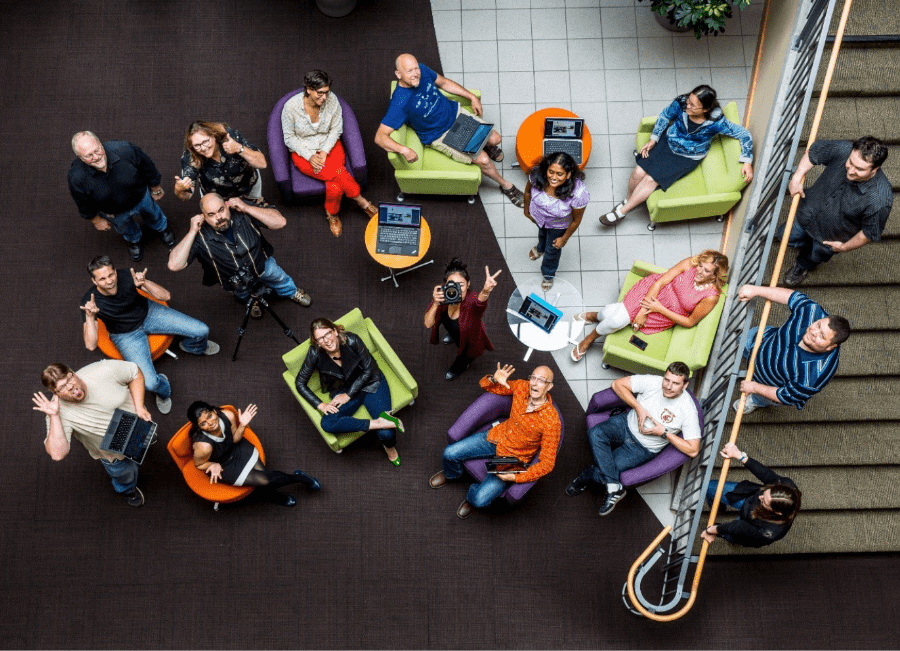
Above: The Microsoft 2014 Hackathon EyeGaze team – Row 1: Dave Gaines, Vidya Srinivasan, Jenny Lay-Flurrie, Matthew Mack (orange shirt), Jon Campbell, Erin Beneteau (on stairs) Row 2: Bryan Howell, Bruce Bracken (camera & tripod), Genevieve Alvarez, Jennifer Zhang. Photo by Scott Eklund, Red Box Pictures
The Ability Hacks: The story of two hackathon teams embracing the transformative power of technology
By Jenny Lay-Flurrie – Chief Accessibility Officer
This week is the Microsoft One Week Hackathon, where employees from around the company work tirelessly to “hack” solutions to some of the world’s biggest challenges. The opportunity to empower people through technology, particularly those with disabilities, has never been more important. Back in 2014, we had 10 ability hack projects, last year we had 150 projects and 850 people, and this year – well, it’s going to be exciting to see.
This is a wonderful testament to our employees and their passion for innovation and conviction in the importance of empowering every person and organization to achieve more.
An inspiration for many was two Ability Hack projects that won the company hackathon in 2014 and 2015, and this year we will be giving away copies to hackers of a new book covering the journeys of those hackathon teams. “The Ability Hacks” shares the behind-the-scenes stories of the hackers who pioneered two innovative hacks-turned-solutions used today by people with disabilities around the world – the Ability EyeGaze Hack team and Learning Tools Hack team.
We hope this book, and the journeys these teams have been on, can help spark a conversation about the transformative power of technology, and encourage engineers and developers to build the next wave of inclusive technology. I encourage you to read, and as a teaser, here are a few highlights:
EyeGaze: Reinstating independence by revolutionizing mobility
“Until there is a cure for ALS, technology can be that cure.” – Steve Gleason, former NFL player
In 2014, former NFL player Steve Gleason, who has a neuromuscular disease called amyotrophic lateral sclerosis (ALS), sent an email to Microsoft challenging employees to develop a technology that could allow him to drive a wheelchair with his eyes. A group of software engineers, program managers, marketers and advocates formed the Ability Eye Gaze hack team and accepted this challenge ahead of the 2014 Microsoft hackathon.
Through hard work, determination and despite a few twists and turns, the team collaborated to build a solution complete with duct tape that allowed Steve to control his wheelchair with his eyes. This invention had impact, ultimately inspiring the formation of the Microsoft Research NExT Enable team, who have continued working on technology for people with ALS and other disabilities. This has already resulted in a new feature named Eye Control, which was developed in collaboration with the Windows team, and was included in Windows 10 last year.
Learning Tools: Transforming education and learning in the classroom
“If you design things for the greatest accessibility – Learning Tools is like that – it makes everything accessible to all, and why wouldn’t we want that?” – A fourth-grade teacher
While Learning Tools involved a different set of players in a different part of Microsoft, its story shares the same lessons, opportunities, passion and impact experienced by the Eye Gaze team. Winner of the 2015 Hackathon, Learning Tools helps students with dyslexia learn how to read and is now transforming education for teachers, students, administrators and parents.
What’s amazing about this story was the diversity of the team, which included developers, a reading team and a speech pathologist, working extensively with students and educators to create the product. While originally created for folks with dyslexia, the Learning Tools team is seeing benefits to folks with dysgraphia, ADHD, English language learners and emerging readers.
Today, Learning Tools is incorporated into apps, Office, and Edge, reaching 13 million active users in more than 40 languages. Like the Eye Gaze team before it, the Learning Tools team evolved from a passionate hackathon into a strategic business. You can even read “The Ability Hacks” using Learning Tools, just download the PDF(+link) and open in Microsoft Edge.
‘It’s not about the technology. It’s about the people.
 As Peter Lee, corporate vice president, Microsoft Healthcare, shares in the book’s foreword, “A focus on inclusion helps a team become more empathetic with its users, which in turn affects deeply the design and development process of products.”
As Peter Lee, corporate vice president, Microsoft Healthcare, shares in the book’s foreword, “A focus on inclusion helps a team become more empathetic with its users, which in turn affects deeply the design and development process of products.”
Personally, I go to work every day feeling humbled that I represent a company with an incredible mission to empower every person on the planet to achieve more. I’m grateful for the chance to share just a few of their stories in “The Ability Hacks.” Trust me, it’s two stories of many that have taken place over the last four years and there will be a lot more in our future.
While we’ve come a long way in incorporating accessibility and inclusivity in everything we do, the truth is that accessibility is a journey. There is more in front of us than behind us. Please read the book and join the conversation about inclusive technology design on Twitter via #abilityhacks. And if you want to create products for people with disabilities, do check out our AI for Accessibility program, which provides access to advanced Microsoft Azure cloud computing resources to individuals and organizations working on empowering people with disability across the world at.
“The Ability Hacks” is also available in PDF and EPUB.
Gotta go. Back to the hackathon tents. Can’t wait to see what folks create this year!

